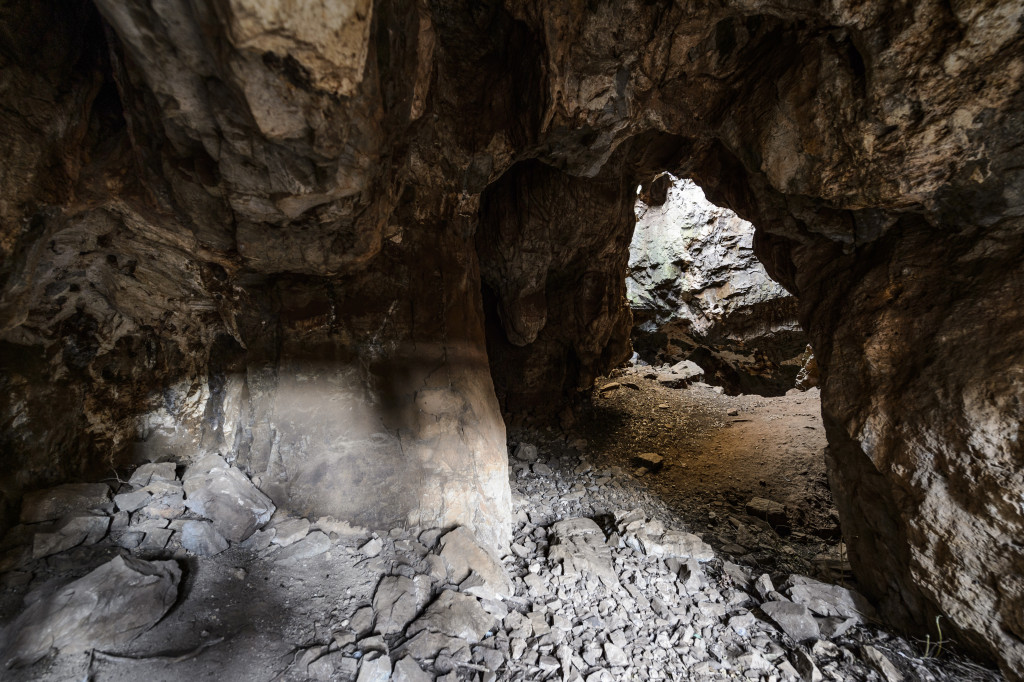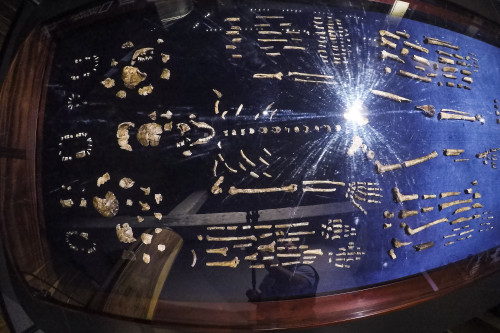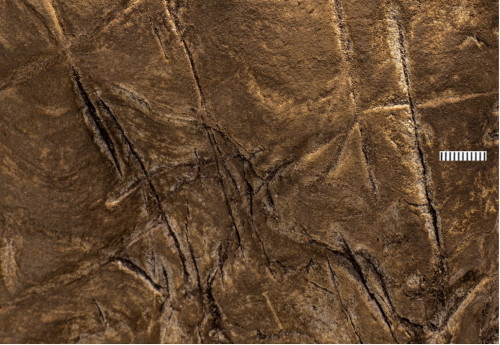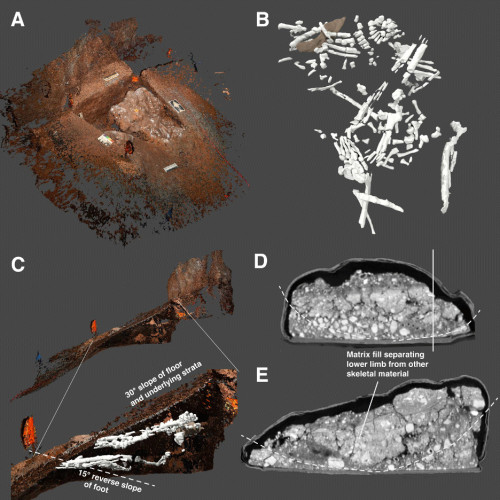Archaeologists uncover evidence of intentional burial, cave engravings by early human ancestor

An entrance to the Dinaledi Chamber of the Rising Star Cave system, part of the Cradle of Humankind World Heritage Site near Johannesburg, South Africa. Newly found grave sites and wall engravings have led a team of archaeologists to reevaluate the meaning-making capacity of an early human ancestor, Homo naledi. Photo: Jeff Miller
Editor’s note: Since initial publication in the journal elife as preprints, these papers have undergone peer review. The reviewers found that the papers in their current state are incomplete; the researchers do not yet have sufficient evidence to make these claims. The publication of these papers concurrently with a Netflix documentary and media campaign centered around one of the other lead authors has fueled controversy in the scientific community. The researchers are following the publication process set forth by the journal eLife and are working to provide further data and methodology information as peer reviewers requested. They plan to publish updated version of the papers in the future.
Across the sciences, authors may routinely post preprints ahead of peer review, particularly in the interest of quickly sharing preliminary information with the public and other researchers. In the biomedical sciences, this practice dramatically increased during the COVID-19 pandemic. While sharing unvetted findings is less common in the field of archaeology, some of the authors felt that publishing preprints ahead of peer review would allow them to get faster feedback from across the scientific community on how best to proceed. In the case of Homo naledi, some researchers felt they needed this input to determine how much further excavation should be undertaken. It is often desirable to preserve as much unexcavated evidence as possible for future research that may involve better methodologies than are possible today. For more information about eLife’s new publication process, here is their website https://elifesciences.org/peer-review-process.
New observations and excavations in South African caves have found that Homo naledi, an early human ancestor, intentionally buried their dead and made crosshatch engravings in the cave walls nearby.
Fossils of Homo naledi were first discovered in these caves 10 years ago by a team of researchers led by paleoanthropologist Lee Berger, now a National Geographic Explorer in Residence, with key participation by John Hawks of the University of Wisconsin–Madison and other UW–Madison researchers. Their new findings, published across three papers ahead of peer review by the journal eLife, are now the earliest evidence of mortuary and meaning-making behaviors in human ancestors.

A composite fossil skeleton of Homo nadedi on display at the Maropeng Museum near Johannesburg, South Africa. Photo: Jeff Miller
Until now, scholars believed that the mental capacity behind complex cultural behaviors like burial and mark-making required a larger brain, like those of Neanderthals and Homo sapiens. And yet, Homo naledi’s brain was only about one-third the size of humans’.
“It’s not how big your brain is, it’s how you use it and what it’s structured for,” says Hawks, an anthropologist at UW–Madison who has helped lead the Homo naledi team since the beginning.
Not only did H. naledi have a smaller brain, but the species also had a smaller frame than their human cousins. Based on the skeletons they have excavated, archaeologists estimate the average H. naledi individual weighed less than 90 pounds and stood under 5 feet tall. That would make navigating the narrow, cramped passageways of the Rising Star Cave System where their remains have been found easy for H. naledi. But for human archaeologists and researchers, the cave site is a challenging environment to study and excavate.
The chambers where the burials and crosshatch markings were found are in the Dinaledi subsystem of the cave, about 50 meters from the main entrance where archaeologists shimmy in. The team found two burial sites, one near the entrance to the subsystem and another further back in another chamber. The engravings are situated on either side of a natural limestone column that leads to the furthest burial site.

A close-up photo of lines carved into stone on cave walls near H. naledi burial sites. University of Wisconsin–Madison
While limestone does erode and crack over time, Hawks says that those natural patterns tend to be easily recognized by their complex “elephant skin” texture. Instead, the artificial engravings are a few bold lines on a mostly flat surface, made of multiple striations that appear to have been made with a tool.
For Hawks, the most convincing line in the panel occurs near a spot in the limestone that has a natural waved texture due to older algae fossils in the walls. The lines making up these parts of the engravings are irregular and appear to have been gone over again and again, as if their creator were persistently trying to etch the markings in as they were diverted by the bumpy texture on the wall.
“That’s not natural,” Hawks says. “That, to me, is really convincing that somebody was making these, and where the rock gets uneven, they had more difficulty controlling and keeping the mark in the same line.”
There is also evidence of percussive marks on these panels, which Hawks says could have been H. naledi hitting a rock to the wall over and over again to make noise.
Remarkably, the crosshatches scored into the wall are also similar to engravings made by Neanderthals that have been found in caves at Gibraltar. The similarity raises a question of whether these types of crosshatches hold a deeply encoded meaning across species of early hominids, Hawks says.
It could be that making these simple patterns is just easy, or there could be something pleasing to the hominin nervous system about making them.
“There’s an intentionality to making a mark,” says Hawks. “But whether that mark was embedded in some system of meaning, we can’t see.”
In this case, he says there is added complexity to understanding the marks’ meaning because they were found in a very significant place — about a meter and a half from a buried body of an extinct species.
To show these burials were intentionally dug, the geology team, led by Tebogo Makhubela from the University of Johannesburg, compared the layers of sediment at the burial sites to adjacent spots of the cave floor. The researchers found that the sediment layers under the fossilized remains of Homo naledi were disturbed, rather than uniformly distributed like in the rest of the cave floor.
This, Hawks says, is a clear sign that the individual didn’t just lie down there and die, but that a living individual dug out a hole and placed the deceased in it before covering the remains with more sediment.

This three-dimensional model shows the burial found at the base of “the chute.” By digging below the bones and encasing them in plaster, the team was able to remove the entire block of remains from the cave and scan it with a CT. The scan revealed a skeleton along with the teeth and bones from at least three other individuals.
The most intriguing burial site the team describes is one at the base of the chamber entrance below a passageway the researchers call “the chute.” In the middle of this space, excavations revealed bones in extremely fragile condition.
By digging around the bones and encasing them with plaster, the team was able to remove the entire block of remains and then use a CT scanner to analyze the distribution of the remains inside. What they found was most of a skeleton, with teeth and bones from at least three other individuals.
The data from those scans showed the three-dimensional arrangement of a skeleton and, to Hawks’ excitement, a rock artifact next to one of the individuals’ hands.
“It is the most interesting thing in the most interesting context that I’ve ever seen,” Hawks says of the artifact. “I think that it’s probably a tool, and I think it’s probably the kind of thing that they dug the holes. But, I love that we can’t say for sure.”
While a 3D-printed replica of the artifact reveals what seems to be flaked edges and a serrated side, no one has actually laid eyes directly on it. For now, there’s no way of definitively saying that it is or is not a tool.
Next, the team will determine the best way to date all of the new evidence. They hope to determine when each individual was buried and whether the panels of crosshatched engravings date back to the same time frame. But before they can conduct that work, they are looking for guidance and feedback from their peers on the best way to proceed.
Hawks says these new findings show that the caves still have more to offer scientists working to understand human evolution. The team wants to get more trained eyes and experts into the caves to look for more evidence they may have overlooked.
“We have to approach it like an escape room. We have to study every hidden detail now,” Hawks says. “This whole cave system might be part of some kind of cultural space.”
UW–Madison researchers and graduate students have been studying and excavating at Rising Star and other nearby excavations in the Cradle of Humankind for years.
In fact, while the most recent excavations in the Dinaledi chamber were taking place, anthropology graduate students Erica Noble and Sarah Johnson were participating in excavations in the nearby Dragon’s Back chamber. That work should publish soon, and Hawks is excited about the further discoveries it will illuminate about human evolution.
To learn more about UW—Madison’s previous work with Homo naledi and human evolution, check out these multimedia stories from Origins.
Tags: anthropology, research




